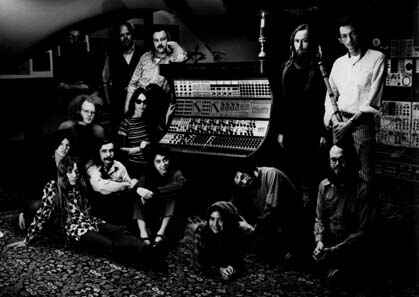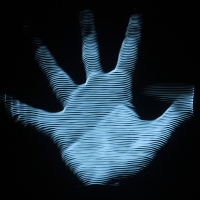more technological determinism, via Don Buchla
Posted in Text on October 20th, 2008 by admin
Don Buchla, the 200 series, and friends (from the electro-music forum)
Ever since I visited the EMS studios in Stockholm late last year, and feasted my ears on the one of the most awesome collections of vintage analog synthesizer equipment known to man, I’ve become a Buchla synth devotee.
Sweden is of course a rather strange place. Like the Netherlands, it appears to be absolutely swamped with arts money. The couple that I stayed with in Stockholm had no less than 13 Genelec monitors just laying around the house, and even the receptionist at EMS had mini-Genelecs as her computer desktop speakers.
Now, to give some sense of scale, Genelecs are pretty much the audiophile monitor of choice, and a good pair runs about a grand in Euros. And to buy any decent amount of vintage Buchla synthesizer modules, you’d probably have to mortgage your house. For the fifth time, if you happen to be from the US. Brand new hybrid digital/analog Buchla systems start at exactly $9950 for the smallest one you can get away with. If you don’t believe me, have a look here.
So somehow it failed to surprise me that between EMS and their close neighbor Fylkingen, they were using old Buchla and Serge racks as doorstops in Stockholm, there were so many of them. When I got into the recording studio there, I was very pleased to discover that Kevin Drumm, a rather reclusive Chicago artist whose work just gets better and better every time I listen to it, had worked in the same studio only a few weeks before. And–better than that–all his ProTools sessions were still on the computer for me to check out and get warmed up with!
The often-repeated story, and still what I believe makes the devices which Don Buchla designs to be so special much more than any particular “sound” they might have, is that he starts by drawing up the front panel and works backwards to the circuit. What this means is that like any proper interface designer, he is thinking of the user interface first, and building the guts of the beast around this experience. As a result, his equipment is esoteric, because of the way that he thinks, but usable because he hasn’t given you access to every possible method of control, but rather he has selected entry points into the system which make the most sense and communicate the most to the musician/composer/sound artist who happens to be sitting in front of it. In a sense, this makes his gear more “user friendly” than others.
Now, a Buchla synthesizer is still not a “simple tool”, nor is it transparent. Every design decision he made is like a garden of forking paths, each with a potentially limitless set of possibilities ahead of it, but very deterministic when one starts their journey. It’s easy to get carried away with a sense of freedom, once one has ditched that moldy Bach holdover of a well-tempered keyboard and embarked on the road of “free music”. But you can’t forget, even for a minute, that whatever system you’ve chosen as your agent of liberation is still dangerously heavy with deterministic factors. Just so you don’t let it all go to your head too quickly…
The phenomenon of the “analog purist” is pretty well known in the sound world, so I found the following anecdote to be somewhat enlightening. I repost from this thread on the electro-music forums, by a certain Howard Moscovitz, or mosc, who as he writes worked for Buchla in the 1970’s and is often considered a “grandpa” on this particular forum and is pleaded to for bedtime stories quite regularly. I think that this particular “bedtime story” conveys some simple truths about the expectations we have of our technological tools, and the ridiculous pitfalls waiting when we don’t actually understand how those tools work.
I used to work for Don Buchla, back in the 1970s. One day a pretty famous composer from Europe associated with a pretty famous conservatory came by Don’s studio in Berkeley to see his new 200 series modular synthesizers. He was very impressed with Buchla’s new creations, but said he wouldn’t use Buchla stuff because it lacked the certain “warmth” that Moogs had. Don listened seriously. After the guy left for the day, Don took out a mixer module (the big one that most people used to send signals to the monitors and recording devices) and while muttering under his breath soldered an extra compensation capacitor (I think it was 100pf) across the op amp. The next day the composer came back (in those days you visited the synth maker for a few days before you bought a big modular system – they were very expensive after all) and he was amazed. The new custom modifications Buchla made for him were fantastic! Now the Buchla had the Moog sound!
What did he do? The larger compensation capacitor rolls off the highs. Don could have turned down the treble control on the amp, but the composer would not have fallen for it. This composer was certainly not a fool for he carefully checked the tone controls on the playback amplifier before he declared the modification to be “right on” (to use a phrase from those days). I learned a two things that day. One was what increasing the value of compensation capacitors on op amps rolls of the highs making Buchlas sound different from Moogs, and the other was that connoisseurs don’t always know what they are talking about.
You might wonder why all this stuff about electronics and building one’s own tools from almost scratch keeps me up so late at night, and the simple truth is this… for someone who failed just about every math class they ever made me take, the more I can learn about all these magical secrets, the more I feel like the thief in the castle who makes off with the crown jewels.
I think I’ve gotten over any naive anarcho-hippy egalitarianism that it’s possible for everyone to do so, however. This is simply because most people are either too focused on quick results. Or lazy. Or both. They will just buy a guitar pedal or download a plugin. The process doesn’t interest them in the least, so they don’t realize how the process funnels them towards the inevitable result.
Reading, Watching, Listening
The Glass Bead Game – Hermann Hesse
Cobra Verde & Heart of Glass – Werner Herzog
Siberian Shaman Wax Cylinder Recordings – privately sent to me by John Hudak
Halve Maen – Double Leopards
Solaris, Zirkalo & Stalker soundtracks – Edward Artemiev
Imperial Distortion – Kevin Drumm
Poison Drinker – Josh Lay
I Don’t Feel At Home In This World Anymore (1927-1948) – Various Artists (Mississippi Records)
Waetka – O.S.T.
